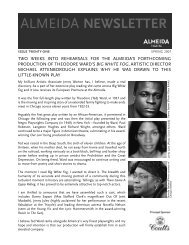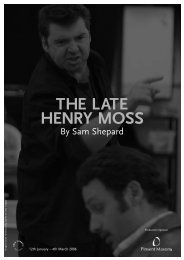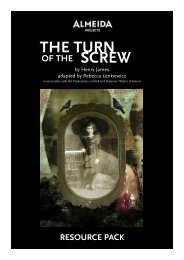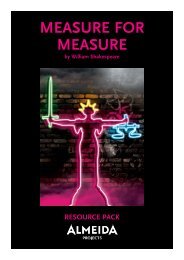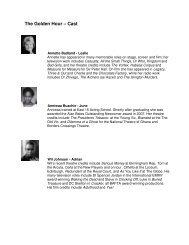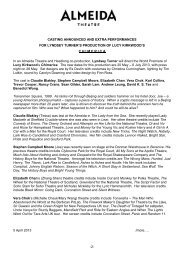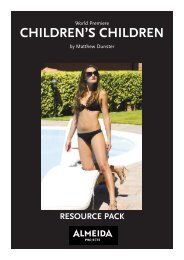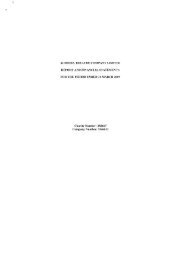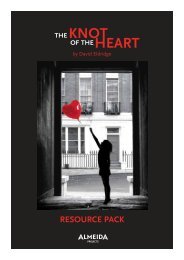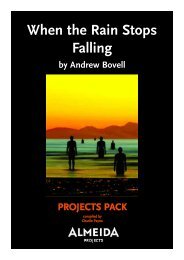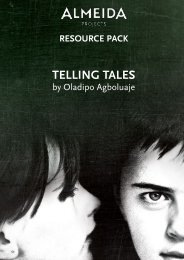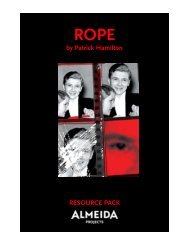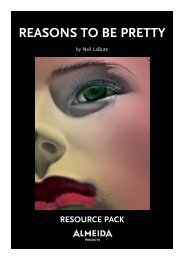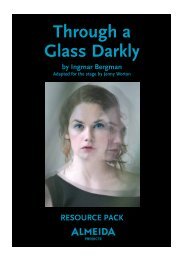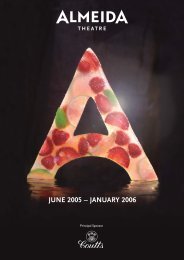MRS KLEIN - Almeida Theatre
MRS KLEIN - Almeida Theatre
MRS KLEIN - Almeida Theatre
Create successful ePaper yourself
Turn your PDF publications into a flip-book with our unique Google optimized e-Paper software.
8<br />
Chronology<br />
1882 – Melanie Klein born Melanie Reizes<br />
in Vienna, March 30<br />
1901 – Melanie engaged to Arthur Klein in<br />
June<br />
1903 – marries Arthur Klein<br />
1904 – birth of Melitta Klein in Rosenberg,<br />
January 19<br />
1905 – Melanie and Arthur travel to Trieste,<br />
Venice, Abbazia<br />
1906 – visit Rome, Naples, Florence, Genoa<br />
1907 – birth of Hans Klein March 2<br />
1908 – Kleins move from Rsoenberg to<br />
Krappitz<br />
1909 – Kleins move to Hermanetz<br />
1910 – Kleins move to Budapest<br />
1913 – London Psycho-Analytical Society<br />
founded October 30 by Ernest Jones<br />
1914 – birth of Erich Klein, July 1. Melanie<br />
possibly goes into analysis with<br />
Ferenczi. She also reads Freud’s<br />
Über den Traum. Arthur conscripted<br />
into Austro-Hungarian army<br />
1916 – Arthur invalided back to Budapest<br />
1918 – Fifth International Psycho-Analytical<br />
Congress held in Budapest. Klein<br />
hears Freud read Lines of Advance<br />
in Psycho-Analytical Therapy<br />
1919 – Klein reads first paper and is made<br />
member of Budapest Society in<br />
June. Arthur moves to Sweden,<br />
Melanie takes children to<br />
Ružomberok during “White Terror”<br />
in autumn<br />
1920 – International Journal of Psycho-<br />
Analysis founded by Ernest Jones.<br />
Berlin Poliklinic opens 14 February.<br />
Klein’s first paper published in<br />
International Zeitschrift für<br />
Psychoanalyse 6. She attends Sixth<br />
International Psycho-Analytic<br />
Congress at The Hague in<br />
September<br />
1921 – Klein moves with Erich to Berlin,<br />
January<br />
1922 – Klein made associate member of<br />
Berlin Psychoanalytic Society.<br />
1923 – Klein elected to full membership of<br />
Berlin Psychoanalytic Society in<br />
February. Reconciliation with Arthur<br />
1924 – British Institute of Psycho-Analysis<br />
established. Klein enters analysis<br />
with Abraham. Melitta marries<br />
Walter Schmideberg in April.Klein<br />
gives first congress paper, The<br />
Technique of the Analysis of Young<br />
Children, at Salzburg. Final<br />
separation of Melanie and Arthur<br />
Klein<br />
1925 – Klein lectures in London for three<br />
weeks in July<br />
1926 – probable year of Kleins’ divorce;<br />
Klein arrives in England in<br />
September, followed by Erich in<br />
December. Klein recorded as<br />
“visitor” at the British Society<br />
1927 – Symposium on child analysis in<br />
May. Klein elected to full<br />
membership in British Psycho-<br />
Analytical Society October 2<br />
1928 – Melitta joins Klein in London<br />
1931 – Klein takes on first training<br />
analysand, W.Clifford M.Scott<br />
1932 – Publication of Klein’s The Psycho-<br />
Analysis of Children. Walter<br />
Schmideberg joins Melitta in<br />
London<br />
1933 – Paula Heimann arrives in England.<br />
Melitta elected to full membership<br />
in British Psycho-Analytical Society<br />
1934 – Death of Hans Klein in April<br />
Melanie Klein (left) holding Melitta as a baby. Courtesy of Wellcome Library, London, and<br />
the Melanie Klein Trust<br />
war it was a transformed country and was a<br />
developing country. The effects of the war in<br />
some ways were profoundly beneficial, not<br />
just to the development of analysis but in<br />
terms of the democratisation of England.<br />
DP: Is that her view or yours?<br />
HS: That’s my view.<br />
DP: And hers?<br />
HS: I don’t think she talked about it much.<br />
What she would talk about was analysis<br />
quite a lot, but also current cultural events,<br />
which were largely English. She used to go a<br />
lot to the theatre and the cinema.<br />
DP: I don’t imagine you interviewed her in<br />
the way that we’re interviewing you. But did<br />
you get a sense of what brought her to<br />
psychoanalysis? And did she ever refer to<br />
the origins of her interest in early childhood?<br />
HS: I think that she certainly went into<br />
analysis for depression. She was a very<br />
depressed woman and I suspect that she<br />
must have been rather hysterical because of<br />
all the symptoms but she attached so much<br />
importance to what she called the<br />
epistemophilic instinct… She was just<br />
passionate about discovering human<br />
nature. An insatiable interest in that, hence<br />
her interest in literature. She originally<br />
wanted to study medicine and she didn’t<br />
because of falling in love rather<br />
unfortunately and marrying an extremely<br />
unsatisfactory man. But when she had a<br />
year to wait – I don’t know exactly how long<br />
– between her marriage or between the time<br />
they had to leave – there was no point in<br />
starting medicine – then I think she started<br />
a degree in literature. I think she was just<br />
fantastically interested.<br />
DP: What kind of things did she like to read?<br />
Was she more interested in central<br />
European literature? French? English fiction?<br />
HS: You could ask me that about Klein or<br />
about me and I couldn’t answer. We were<br />
interested in good books. Some were<br />
Russian, some were English and some were<br />
French. She was also very fond of theatre<br />
and of music too. She played the piano and<br />
she went to concerts.<br />
Jane Milton: What sort of music did she like?<br />
HS: Mostly classical. That was her<br />
favourite. But she was also very jolly. She<br />
liked a good laugh, she liked<br />
wine. Somewhere once – I think it was in<br />
the Dordogne – she won a wine tasting<br />
competition. A very rare achievement for a<br />
woman! And once, at a Hungarian<br />
exposition, we got a big box of real genuine<br />
Tokai and she liked it so much we kept it for<br />
her special usage. She was extremely<br />
sociable, she liked a good party, a good



